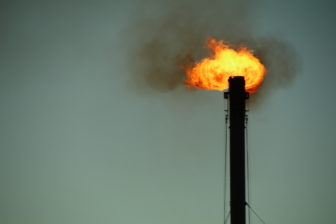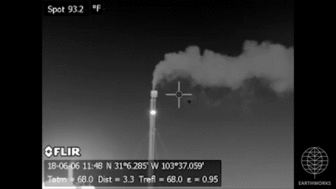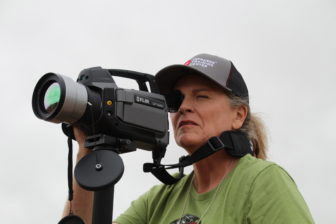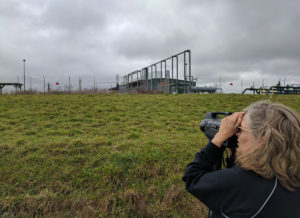Oil and gas companies often claim they limit pollution by using “best practices.” But what happens when those practices actually make things worse?
Such is the case with flaring natural gas, which operators and regulators claim is necessary to avoid the build up of flammable methane at well sites. But as a series of four recent studies, all focusing on the Permian Basin in Texas, show, huge volumes of gas are being dumped straight into the air because it’s easier and cheaper for operators—although devastating for climate and health.

This month, Energy Intelligence, a global energy industry and policy think tank, published findings of a comprehensive review of records from both the Texas Railroad Commissions (RRC) and operators on the practice of flaring and venting. In short, RRC has been fast-tracking drilling permits and has never denied an operator’s request to increase flare (despite laws ostensibly limiting the practice).
In addition, evidence doesn’t support industry’s constant claim that flaring happens because of a lack of pipeline capacity to transport gas to markets. Instead, the real reason appears to be that operators view gas as a waste product; they can make big money on oil, but overproduction of gas has made it so cheap that they’d rather burn it off.
Energy Intelligence’s investigation also states that, “Corporate commitments to dramatically reduce flaring don’t seem to apply to the Permian.” Companies count flaring reductions elsewhere (such as overseas or shut-in wells), but it’s business as usual in one of the world’s highest producing oil fields. This approach can make a corporate image shine—even when the corporation makes the air far dirtier.

In July, a study by Texas A&M University researchers compared emissions from flaring and venting in Texas RRC records with National Oceanic and Atmospheric Administration (NOAA) records from satellites detecting the practice. Both data sets show a rapid increase in emissions from the practice in recent years, but the NOAA data indicates levels double those claimed by operators. The researchers attribute this in part to a regulatory loophole that allows operators to skip reporting pollution from certain production practices.
Such conclusions parallel those from market research giant S&P Global, which last fall identified wide discrepancies in emissions from flaring between operator self-reported data and satellite measurements taken by federal agencies. A key S&P conclusion is that operators may be deliberately under-reporting pollution from flaring so they can keep producing oil unhindered by regulations.
Earlier this year, an Environmental Defense Fund (EDF) analysis of reported versus measured flaring emissions concluded that twice as much natural gas is wasted in the Texas Permian Basin as industry claims. According to EDF, “Permian oil and gas operators burned enough gas to serve all the heating and cooking needs of the state’s seven largest cities.”
This series of important third party analyses put numbers and context to Earthworks’ investigations on the ground in the Permian Basin. Staff with our Community Empowerment Project who are trained and certified in the use of Optical Gas Imaging (OGI) cameras have documented many improperly operating flare stacks, which vent a dangerous brew of methane and toxic volatile organic compounds.

Using a special tool to measure emissions documented with an OGI camera, Earthworks has found that even a single unlit flare measured in the Permian Basin could, if left unaddressed, potentially release the same volume of greenhouse gas emissions into the air in a year as over 2,000 average US residents, or thousands of average passenger vehicles.
Methane is a powerful greenhouse gas 86 times worse for the climate than carbon dioxide in the short term. Yet operators driven by corporate profits continue to dump methane into the air despite available technological options to capture it. The real bottom line is that there’s no place for more flames and smoke by oil and gas operators on a warming planet.
For more background on the Texas Permian Basin & flaring: “NBC Left Field: Texas is on Fire with Polluting Flares from Fracking.”

